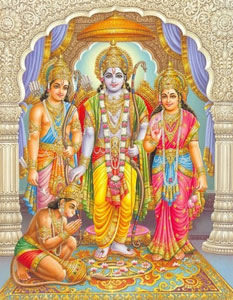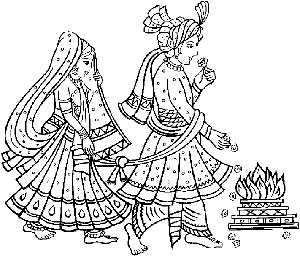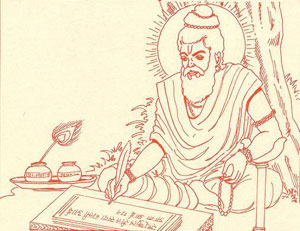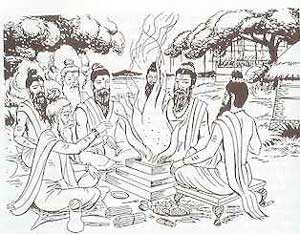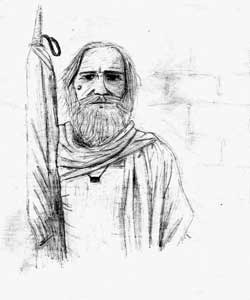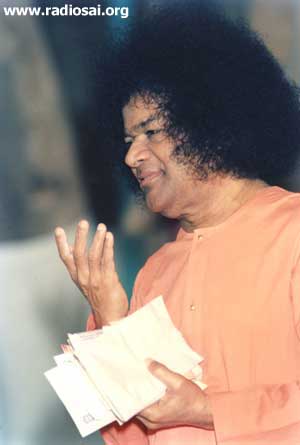 |
 |
 |
 |
| Volume 4 - Issue 07 JULY 2006 |
|
|
MUSINGS FROM PRASANTHI NILAYAM A HOUSEHOLDER’S LIFE – THE VEDIC WAY
Loving Sai Ram and greetings from Prashanti Nilayam. The Stage Of The Householder This is my sixth talk in the Veda Walkthrough series. Last time, I finally started on the Walkthrough in the way I had been planning all along, and took you up the stage where a young boy is admitted to the Ashram of an Acharya to learn the Vedas. We now cut to the time when the disciple leaves and prepares to enter life. He returns home, rejoins his family, and with the consent of his parents and relatives, marries and settles down to discharge his duties in life along with his wife, as ordained by the scriptures. I shall commence with some verses chanted during the marriage ceremony. But first, a few words of introduction about the concept of marriage in Vedic times.
Marriage In The Vedic Times Things were very different in Vedic times. Humans did not see themselves as freewheeling individuals but as a vital part of a cosmic whole, in which everyone played a part as ordained, to sustain the wheel of life and Dharma. Dharma - that was the key word. The Brahmin, in particular, had not only to personally uphold Dharma to the best of his ability but also had the responsibility of guiding others in doing the same. In this task, the wife was his partner, and that is why the word used for wife was Sahadharmini, meaning ‘one who participated with equal right, in upholding Dharma’. How did the couple uphold Dharma? Not merely by being truthful in all their actions but also by discharging their various duties. Maybe I shall come to that a bit later, but for the moment let us take it that in Vedic times, marriage was more than a matter of procreation and propagating the human race. Swami has, in some of His Discourses, especially a memorable one given during the Summer Course of 1996, described the marriage of Rama and Sita. He said on that occasion, that this was no ordinary marriage – it was the coming together of Paramatma and Prakriti, meaning the coming together of Cosmic Consciousness as represented by Rama and Divine Shakti or Divine Energy as represented by Sita. In a sense, the union of a man and a woman in holy wedlock symbolises the coming together of complimentary parts, to make a whole.
Turning to the marriage ceremony itself, it was a pretty elaborate affair, that included the father giving away the bride to the bridegroom. Here it is pertinent to recall what Swami said about the marriage of Rama and Sita. There was the holy and sacred fire and Mantras were being chanted both by Janaka the father of the bride and Rama, as appropriate, guided of course by celebrated Rishis like Viswamitra and Vasishta. At one point, Janaka says, here is my daughter Sita. Rama was expected to turn towards her and take a look at her. He did not. Emperor Janaka repeated the statement again; once more, Rama did not turn to look in the direction of Sita. When Janaka repeated that statement for the third time, Rama said to Janaka, “I am not yet formally married, and an unmarried man must not look at other women”. One might say that this was the limit, but that was how seriously the observance of code of conduct was taken in those days Marriage Vows Made Before The Sacred Fire One striking thing about the Vedic marriage is the central role played by the sacred fire. Agni, the Lord of fire, plays the role of a witness, and all declarations and promises are made with Agni as the witness. This is the equivalent of taking an oath placing one’s hand on the Bible or Quran or whatever. In the Vedic system, the entire marriage was performed with Agni as the witness. Once one swears by Agni, one is supposed to keep one’s promise, come what may.
The couple then depart from the wedding site, the bride following the groom to his house, or rather the house of his parents. When they leave, they carry in an earthen pot a part of the sacred fire, which they are supposed to keep alive throughout their marriage. Fire thus becomes the constant witness in the lives of the couple. When the couple reach the house of the groom, he says,
There the couple sit in silence till dusk falls and the stars become visible. The couple then go out when the husband points the pole star to the wife, saying,
I am not sure if I have given the flavour of the Vedic marriage rites but if I have managed to convey the cosmic view they had of marriage in those times, then I would have done my job. What Is Our Dharma? Let me get back to this Dharma business. Dharma is often translated as righteous conduct. To us with a so-called secular vision, right conduct might mean being truthful, not harming others and so on. Yes, all these do form a part of right conduct, but in those times, duty was the corner stone of right conduct. A man might never tell a lie, a man might never harm another person, but if he was not true to his duties, then he was straying away from Dharma. In life, duty called for, among other things, the expression of gratitude. These days, seldom does one realise what one owes to others. After the end of the famous battle of Britain, Winston Churchill said in a tribute to the young men of the Royal Air Force, “Never have so many owed so much to so few.” In life, each of us owes so much, to so many, starting from God. The Five Yajnas In Vedic times, Yajna was one of the means by which various debts were discharged. Swami says, There are five Yajnas prescribed as mandatory for every human being. Let me now list these five Yajnas spelt out by Swami. They are
Here I am reminded of a talk that late Mr. V.K.Narasimhan, then Editor, Sanathana Sarathi, gave to Swami’s students in the Divine presence in Trayee Brindavan. Mr. Narasimhan said, in his own inimitable style of course, “Many of you students dream of going to America because that seems like the land of milk and honey. But do you know that if America is prosperous today, it is because of the tremendous hard work and enormous sacrifices made by the immigrants of last century? You want to enjoy the benefits of their sacrifice but what about your own contribution? This country needs sacrifice, and you must stay here and do what the immigrants did in America a hundred years ago. If you did that, then this country too would become prosperous.” Talking of America becoming rich, I am reminded of a nice story involving the famous film actor and comedian Danny Kaye, who was once the UNICEF Ambassador, bringing love and cheer to children all over the world, especially in countries where there was much suffering. Danny Kaye’s father came to America from Poland maybe in the very early part of the last century. As you perhaps know, hundreds of thousands of people from all parts of Europe poured then into America, seeking a better life. Danny Kaye’s father was one of them. After a few years, he returned to his hometown in Poland for a brief visit. His friends back home immediately surrounded him and plied him with all sorts of questions about America. One of them asked, “Is it true that in America the streets are paved with gold?” Danny Kaye’s father said in reply: “No, it is not true that the streets in America are paved with gold. In fact, most streets are not paved at all, even with stone. And do you know what my job is? Paving streets with stone!” So you see, there is no free lunch ever, and for whatever benefits we enjoy granted to us by Society, we have a duty to be thankful for it. In the Vedic age, the expression of gratitude formed an important part of one’s life.
I cannot but recall here a Trayee session many years ago when I was privileged to be present, along with Swami’s students. Swami said that modern man ridicules the ancients as being superstitious and stupid. Modern man says, “Look at those fools. They worship the land, the water, the air, and even snakes. How idiotic!” Swami then said, “The ancients did not pollute the air, they did not pollute water, and they respected all the constituents of Nature, including all animals. But modern man, besides polluting heavily land, water and air, is also destroying entire forests, and wiping out many species of animals, without concern for eco- and bio-balance. Who is more stupid? Modern man who is wrecking all the gifts of God, or the ancients, who not only preserved what God gave them but also were thankful to God for the blessing?” One cannot give a more powerful assessment of Vedic life and philosophy. Incidentally, this respect for ancestors and the environment is to be found in many traditional cultures, for example among the American Red Indians. Only, the Vedic seers saw the Universe in a much larger cosmic setting than did people of other cultures, as I shall perhaps explain in a later lecture. A couple of words now about the remaining two Yajnas, namely the AthithiYajna and the Bhuta Yajna. The former involves offering cordial and loving hospitality to guests, while Bhuta Yajna means doing everything one can to sustain all components of the environment – plants, trees, fishes, birds and animals. The husband dutifully performed all these Yajnas, and the wife rendered all the support that was necessary. Family Duty Before I proceed further with the Vedic journey, I think it is worthwhile for me to pause for a moment and reflect on the above Yajnas, especially their relevance to modern times. To many, all these may appear to be an utter waste of time but instead of focussing on the procedures associated with Vedic rites, let us concentrate on the basic principles of Vedic life. The first thing is the concept of a family. The family is the atom of Society, and it has been so throughout history, in all places and all cultures. It is only in recent times, that the traditional concept of the family is being severely rocked with practices that seek to make marriage irrelevant, all in the name of personal freedom. I recall reading, when I was the Vice Chancellor, a Convocation address given by a Canadian lady, an educationist, to one of our Universities. She said that a hundred and fifty to hundred years ago, most people in Canada lived on farms. Every farm was run by a family, and all the farm work had to be done by the members of the family – the father, the mother, the sons and daughters. Since all did more or less the same type of work, there was no question of gender bias and there automatically prevailed a sense of equality. The Canadian educationist then said that when Canada started getting industrialised and more and more people started moving to the cities, things changed suddenly and dramatically. Many men went to work in offices and their work took them on tours. They could then have a good time while on the road, drinking, spending time on the golf courses, visiting nightclubs, and so on. The women, on the other hand, slogged in the home, doing kitchen work, bringing up the children and so on. The lady said that was when feminist feelings started to rise and become strong. The Importance Of Gratitude What I am getting at is that when life strays away from duty, imbalance results. In Vedic Society, the focus was always on duty, responsibility, and the sustenance of Society as well as Nature. Analyse every Yajna that I mentioned, and you will find the undercurrent of duty. Let us take Rishi Yajna as an example. One may say, “Why should I be bothered? I don’t care for the Rishis.” The point is not being bothered about Rishis but that one moves forward on what we have been handed down. You know what Newton the great scientist said? He said, “If I have been able to look farther than others, it is because I was standing on the shoulders of others.” We do this all the time in Science. We can’t say, “This Galileo, he lived five hundred years ago. His is old stuff. Forget it!” We can’t do that. When we teach first year physics, we have to teach what Galileo, Newton and even Archimedes discovered. There is an essential continuity in knowledge, in all branches.
As for Pitru Yajna, it does not mean performing some kind of rituals but remembrance of dead ancestors and, more important, being ready to perform any sacrifice for one’s parents. The compulsions of modern life have become such that people have been slowly conditioned to giving importance to their own personal security in terms of money, job, career and so on. Inevitably, parents slide down in priority, especially when they have fulfilled their role. The next thing is that they are seen to be as irrelevant and a nuisance. This is not a Western attitude but a global one. I recall seeing two wonderful dramas staged in the Poornachandra Hall many years ago on the occasion of the Chinese New Year Day. In both, the theme was how in the present day, elderly parents are neglected or even abandoned. I learnt then, that this sort of thing happens not only in America and India but also in China. By the way, on both occasion, there was young Chinese boy who literally stole the show. He was a great hit, and Swami liked his acting very much.
Today, the Green people and such others make a lot of noise about the environment. Very good and very necessary. But why this need? Because people have forgotten all about Bhuta Yajna. In Ecuador, they want to cut down pristine rain forests to drill for oil. In Alaska, the wilderness is being disturbed for oil. In China, huge dams are being built so that more electricity can be generated. A Chinese environmentalist was asked about these dams. She said that the dams were a disaster. She was then told, “But if dams are not built, then more coal would have to be mined. Mining is a dangerous activity and so many people are being killed. Moreover, coal-fired power stations will belch carbon dioxide. So, is it not better to generate electricity out of water from dams than from coal?” The environmentalist replied, “I think there is yet another alternative. It is to decrease our desires, our wants and our consumption. Then we would not need so much electricity. And when we do not need extra electricity, we do not have to build dams or mine more coal.” So this lady has, by her own reasoning, come to the same conclusion that formed the basis of Vedic Society; only, the Vedic seers linked it all always to God. Let me wrap up. Man married mainly to sustain Dharma, with his wife as an equal partner. He had his part to play and she had hers. Nothing was considered inferior and nothing was considered superior. Duty, responsibility and obligation formed the core of one’s life. The Vedic seers were firmly of the view that it was only when these virtues were given primacy, that there would be harmony in Society and human life could be sustained properly. Today, most virtues are summarily dismissed on one of two counts. Either one says it is irrelevant or one says it is not workable in this day and age. I believe both arguments are false and escapist. What Is Freedom?
I am sorry I did not give as much details of the wedding Mantras as I would have liked, but I hope I can make amends when we manage to bring a vedic scholar to our studios. Next time, I shall take you a bit more along the Vedic path, giving glimpses of how Dharma was sustained in Society. Thank you. Jai Sai Ram. – Heart2Heart Team |
|||||||||||||||||||||||||||||||||||||||||||||||||||||
| You can write to us at : h2h@radiosai.org |
Vol 4 Issue 07 - JULY 2006
|
Best viewed in Internet Explorer - 1024 x 768 resolution. |
DHTML Menu by Milonic. |





